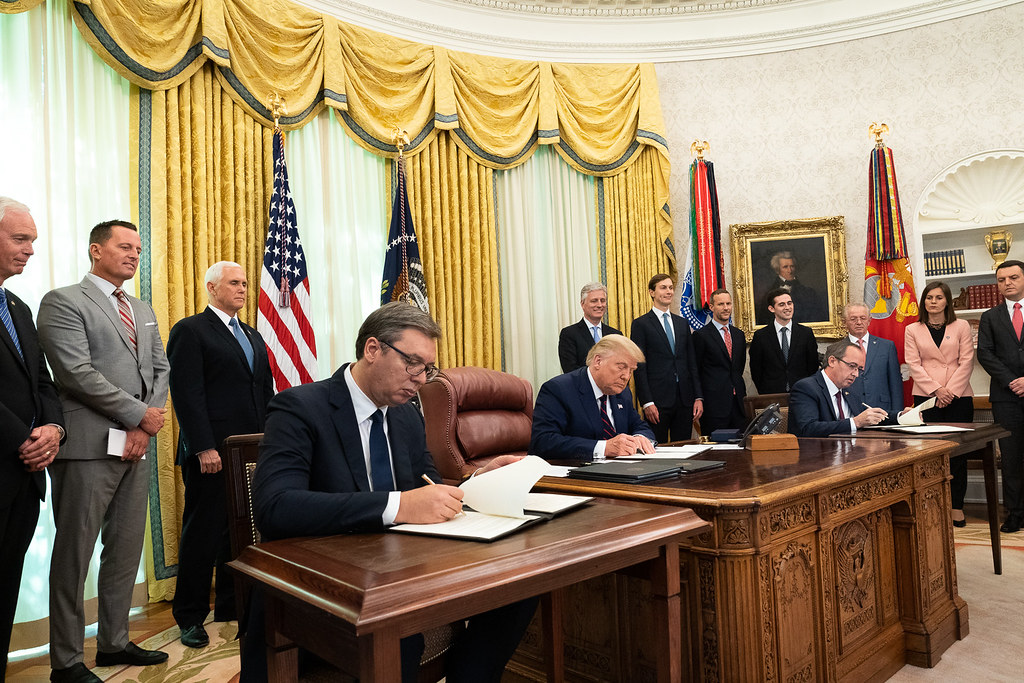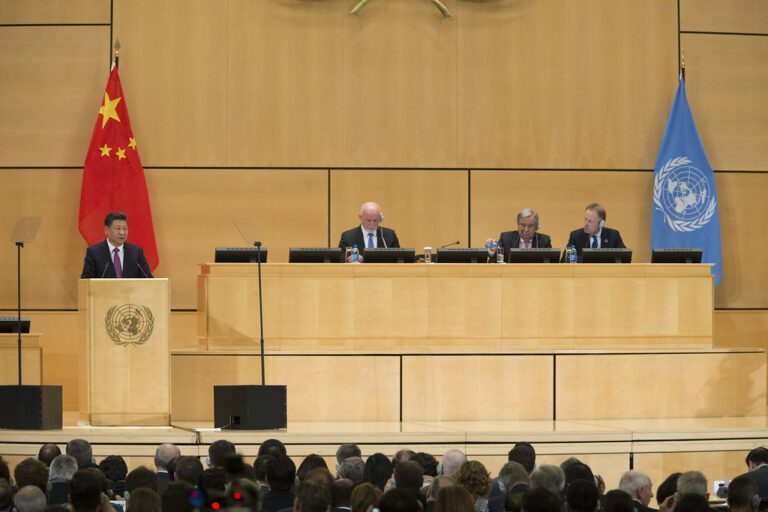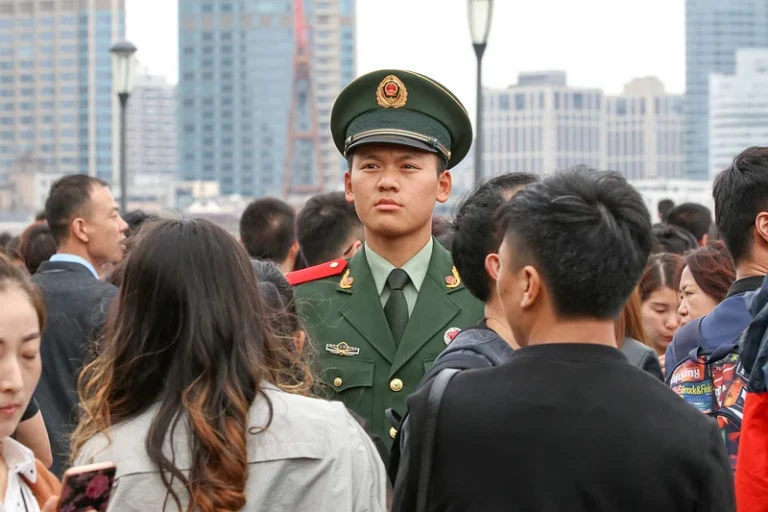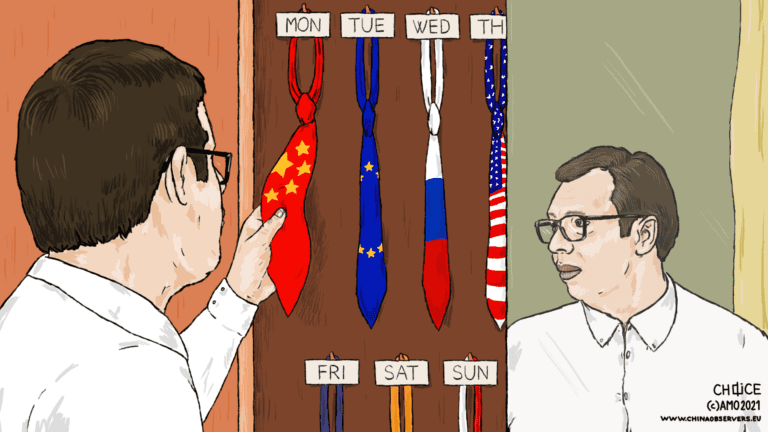
In early September, the President of Serbia Aleksandar Vučić sat next to his US counterpart Donald Trump and Kosovo’s Prime Minister Avdullah Hoti in the Oval Office to announce the restoration of economic ties with Kosovo. Although it is one of the biggest breakthroughs between two sides in the past decade, it came as a surprise. Alongside the restoration of economic ties, both sides signed an agreement which vowed not to use 5G equipment supplied by untrusted vendors, presumably Huawei, therefore aligning with US policies. The “steel friendship” between Serbia and China, which was reaffirmed during the early months of the pandemic, apparently has a new challenger as the current US administration is trying to use every diplomatic opportunity to counter Beijing. Serbia could not refuse to opt out from parts of the agreement, especially since funds were promised in return.
Yet, back in Belgrade, after the agreement, Serbian officials openly pledged to deepen cooperation with China and Huawei. The Chinese ambassador to Serbia was assured in person by President Vučić that Serbia would continue to develop bilateral cooperation with China in all areas, including telecommunications. That was followed by the opening of a Huawei Innovations and Development Centre in Belgrade by the Serbian Prime Minister Ana Brnabić.
Starting from the 17+1 and Belt and Road initiative (BRI) through which China has loaned and invested more than $9 billion, to the mutual support on political issues such as Taiwan or Kosovo, recent years have shown that Serbia is fast becoming one of the favored business and political partners for China. In spite of recent controversies over Hong Kong’s new national security law and re-education camps in the Xinjiang region, Serbia has proven its loyalty and allegiance to China. Given the circumstances, the course of this friendship that has been building for years will be difficult to change.
Corona Diplomacy Between Serbia and China
China’s standing in Serbia has been rising for a long time, especially after President Xi launched BRI, of which Serbia is a prominent participating country. The COVID-19 pandemic has only further strengthened this trend. When the epidemic started in China, Serbia was among the first countries to offer help. In early February, Serbian President sent a letter of support to Xi Jinping, expressing solidarity with the Chinese people and readiness to send assistance. While the rest of the world was looking for ways at how to respond to the pandemic’s outbreak in late February, the Serbian Minister of Foreign Affairs, Ivica Dačić, was in Beijing ostentatiously lending his support for Chinese leaders and saying, “You didn’t fear NATO bombs, my visit shows we’re not afraid of the virus”. Dačić sought to recall the common past and the NATO bombing of Belgrade in 1999 when the Chinese embassy was hit by US planes and three Chinese citizens lost their lives. A few days before his departure, the Serbian political elites organized a concert to show solidarity with the people of Wuhan in the Serbian capital.
When the COVID-19 virus spread to Serbia in March, the government declared a state of emergency and appealed for international assistance in combating the virus. Due to the EU’s temporary ban on medical equipment exports, Serbia was unable to secure urgent medical aid. President Vučić jumped to call European solidarity a “fairy tale” and accused the bloc of hypocrisy. He further expressed the belief that China was the only country that could help, calling Xi Jinping a friend and a brother of the whole country. His appearance went viral on Chinese social media, leading many Chinese citizens to look for ways to donate to Serbia amid COVID-19. Ultimately, the Serbian embassy opened an official Weibo account which gained a million followers in a week, while the video of president Vučić kissing the Chinese national flag attracted more than 600 million views.
The Serbian critique of the EU and praise for China helped amplify Beijing’s global propaganda about the advantages of its political model. It bolstered China’s desired image of a competent and responsible power, ready to provide help to countries in need. Simultaneously, the Serbian media portrayed the EU and the US as unable to control the pandemic and help others. While China did respond quickly, it was disproportionately praised by the Serbian political elite for the humanitarian aid Serbia received, compared to the EU, Germany, or Norway. The question remains to this day what portion of medical equipment, including masks, respirators and other supplies, was humanitarian aid and what amount was purchased from China, since it was not publicly stated due to the request fromm the Chinese side.
From the start, Chen Bo, the Ambassador of China to Serbia, has been active in promoting Chinese aid, winning over sympathy for her command of the Serbian language. China sent a medical team to Serbia in March and April which then cooperated with the advisory body of the government. They also helped establish two laboratories for coronavirus testing.
On the other hand, the EU found itself in the midst of a PR crisis. After initial hiccups, the EU donated funds and medical equipment to Serbia but the media coverage was lackluster. Brussels then put pressure on Serbia, emphasizing that cargo planes and other supplies shipped to Serbia should be welcomed by high-ranking state officials the same way as Chinese help was.
Chinese aid was accompanied by organized campaigns in cyberspace. The Digital Forensic Center (DFC) analyzed posts on Twitter for the period from March 9 to April 9 and discovered 30 thousand tweets coming from accounts in Serbia that contained the keywords Kina (China) and Srbija (Serbia). The analysis demonstrated that the tweets praised the Chinese aid and friendship between China and Serbia, and lambasted the purported lack of assistance from the EU. More than 70% of the content was produced by a huge pro-Serbian government network of bot accounts. Linking this data with public opinion polls regarding the perception about the country’s biggest donors, we can say that this campaign ostensibly fulfilled its goals.
China as the Biggest Donor to Serbia
The EU’s initially slow response to the pandemic compared to the strong Chinese reaction left an impression on the Serbian public, presenting China as a generous aid donor. This was further reinforced by Serbian officials and state media, which systematically downplayed help from the EU and praised Beijing. According to research conducted in March/April, when people were asked the question “Who do you think is the biggest donor in Serbia?”, as many as 40% of Serbian citizens said China was the largest donor, while 17.6% mentioned the European Union and 14.6% considered Russia the largest donor. It remains to be seen whether the same perception will endure in future surveys without the same amount of favorable media coverage. Interestingly, compared to previous polls prior to the pandemic, the perception of China as the biggest donor increased by 20%. The aforementioned research clearly shows that COVID-19 helped China “win the hearts and minds” of Serbian citizens. The fact of the matter is that the EU, Germany, and the US provided Serbia with the most aid during the pandemic and that assistance continues to this day.
For the first time, Russia was conspicuously absent from the Serbian public discourse during the pandemic. This was quite unusual, since Putin enjoys the support of around 60% of Serbian citizens and is usually presented as a big brother and the main “savior” in times of crisis. This time he was left behind, with Xi`s China taking the central stage, being seen favorable by more than 35% of Serbians even before the pandemic. Things got even worse after the Washington deal, when a Russian Foreign Ministry spokeswoman compared President Vučić’s visit to the White House with a scene from the movie Basic Instinct. Her inflammatory comments grabbed headlines immediately, and even prompted a rare apology from both Foreign Minister Sergey Lavrov and Russian President Vladimir Putin.
Space to Maneuver has Started to Shrink
The US-China rivalry is slowly spilling over into the Balkans. It was quite a surprise for the Serbian public that the Washington agreement contained provisions regarding Huawei. For Kosovo it was easier to seal the deal, since it does not have official relations with China, but president Vučić clearly knew it could harm Belgrade’s relations with Beijing. As the mood toward China changes across the EU, more pressure will be exerted on Serbia to curb its relations with China. This shift, among others, could help bring accession to the EU back on the agenda. Despite the growing ties with China, the majority of the population still supports EU integration.
Yet, for the time being, the price for supporting China politically is not egregious, and Serbia is willing to pay. Belgrade still has room for closer relations with China, bearing in mind that enlargement is certainly no longer a priority for the EU. Also, Serbia, as a non-EU member, is not obliged to follow the common foreign and security policy defined by Brussels, which gives Belgrade significant room for maneuvering and accommodating Beijing on certain political issues.
As economic recession looms large, potential economic benefits from Serbia’s cooperation with China may rise in significance. Furthermore, as mask diplomacy gives a way to vaccine diplomacy, China may again have a strong hand to play. China’s COVID-19 diplomacy has multiplied efforts to strengthen its public image both domestically and across the world, solidifying itself as a world power. Beijing is lacking friends in the fight against the US and for them, it’s not expensive to gain one more, because Sino-Serbian relations are just a small piece in a big puzzle.
Written by
Vladimir Milić
vladimir_milicFounder and editor of a Serbian web portal savremenakina.rs about contemporary China.


